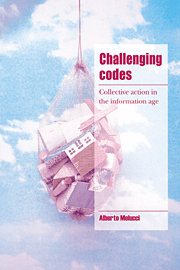Book contents
- Frontmatter
- Contents
- Preface and acknowledgements
- Introduction
- Part I Theory of collective action
- Part II Contemporary collective action
- Part III The field of collective action
- Part IV Acting collectively
- 15 Mobilization and political participation
- 16 The organization of movements
- 17 Leadership in social movements
- 18 Collective action and discourse
- 19 Forms of action
- 20 Research on collective action
- References
- Index
20 - Research on collective action
Published online by Cambridge University Press: 23 November 2009
- Frontmatter
- Contents
- Preface and acknowledgements
- Introduction
- Part I Theory of collective action
- Part II Contemporary collective action
- Part III The field of collective action
- Part IV Acting collectively
- 15 Mobilization and political participation
- 16 The organization of movements
- 17 Leadership in social movements
- 18 Collective action and discourse
- 19 Forms of action
- 20 Research on collective action
- References
- Index
Summary
At the border
The object of knowledge constructed by the study of collective action attains a significance that expands beyond the strict boundaries of the subject matter at hand. Probably no other field of sociological inquiry today is brought, through multiple linkages, to such a close contact with other areas of sociological research. In systems with a capacity for self-production that far exceeds the achievements of any society in the past, the forms of action most distant from reproduction and the maintenance of social order signal processes that involve the system in its entirety: they affect the fundamental orientations of society, the direction of change, the basic moral and political choices. Precisely for this reason, analysis of movements provides insights that point behind the back of the collective actors as empirical facts. By their action that challenges the dominant discourse and mobilizes the creative energies in society, movements force us to reflect on the question of how social action – and perhaps individual action as well – constitutes itself in systems where the available resources over-whelmingly exceed reproductive needs.
If social action in complex systems has prominently shifted from the inherited to the constructed, society can no longer be conceived as the replication of the social order embedded in institutions and roles; rather, it has become a field of cognitive and emotional investment which creates its own meaning.
- Type
- Chapter
- Information
- Challenging CodesCollective Action in the Information Age, pp. 380 - 397Publisher: Cambridge University PressPrint publication year: 1996

